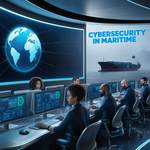Port Authority
A port authority operates ports and other transportation infrastructure for a special-purpose district. Whether operated directly by the government or in cooperation with government agencies, North American port authorities are public entities and are governed by a board or commission. Most port authorities are financially autonomous. Port districts may also operate shipping terminals, airports, railroads, and irrigation facilities. The port authority often owns land, dictates fees, and collects taxes.

Singapore March Marine Fuel Sales Recover After February Low
Marine fuel sales in Singapore, the world's largest bunker hub, improved in March…

Moored Dredger Sinks off Singapore, No Casualties Reported
The Maritime and Port Authority of Singapore (MPA) has reported that a moored Belize…

Oil Leak at Malaysian Terminal Contained as Clean-Up Op Begins
The Johor Port Authority has informed the Maritime and Port Authority of Singapore…

MPA, Dalian Maritime University Renew Partnership
The Maritime and Port Authority of Singapore (MPA) and Dalian Maritime University…

Wilhelmsen Port Services, Yinson GreenTech & R W Marine Services Sign MOU
Wilhelmsen Port Services has signed a Memorandum of Understanding (MOU) with Yinson…
Singapore Launches World-First in Cybersecurity Training
New MariOT testbed aims to strengthen shipboard cybersecurity, train next-gen maritime…

Singapore and India Partner on Maritime Digitalization and Decarbonization
Singapore and India have signed a Letter of Intent (LOI) to cooperate on maritime…

Singapore Marine Fuel Sales Drop
Singapore marine fuel sales fell to their lowest in 20 months in February, official…

Singapore Sets New Standard for Methanol Bunkering
Singapore, the world’s largest bunker hub for ships, has launched a new standard for methanol bunker

B30 Marine Fuel Tanker Transport OKd in Singapore
Licensed bunker tankers operating in the Singapore port will be allowed to carry and deliver up to 3

Steelpaint Inks Deal to Refurbish Emden Lock
Emden’s Great Sea Lock (Große Seeschleuse) is to be protected from corrosion with…

Chemical Tanker Boarded in Singapore Strait
The Maritime and Port Authority of Singapore (MPA) has reported an unauthorized boarding…

As the maritime industry undergoes a digital transformation, the integration of advanced technologies such as automation, Internet of Things (IoT), and big data is revolutionizing operations. However, this digital shift also brings significant risks, particularly in the realm of cybersecurity. Protecting maritime assets, systems, and data from cyber threats has become a critical priority as the industry becomes more connected and reliant on digital infrastructure.
The maritime industry, a crucial pillar of global trade, has always grappled with the challenge of piracy. Over the past few decades, the nature of piracy has dramatically evolved, and new technologies have become a double-edged sword. On one hand, they offer improved safety and navigation capabilities; on the other, they provide pirates with unprecedented tools that enhance their capacity for disruption, theft, and violence. Let's delve into the growing threat of new technologies in maritime piracy and the implications for global maritime security.
The vast, open oceans have long served as conduits for commerce, adventure, and exploration. However, along with the grandeur of maritime activities comes inherent risks, one of which is the specter of armed robbery at sea. Also known broadly as maritime piracy, this menacing threat envelops not just the economic marine highway but also the lives and safety of those who navigate it.
The maritime industry offers a vast array of career opportunities, each playing a crucial role in the global economy. From navigating the high seas to ensuring the smooth operation of ports and shipping lines, maritime careers are diverse and dynamic. This article explores the various career paths available in the maritime industry, the skills required, and the benefits of pursuing a career at sea.
All nations require certain standards be met by ships and other marine structures which fly their flag. A classification society, or "Class", is a non-governmental regulatory association which regulates construction of vessels and offshore structures in the maritime industry.













 Read the Magazine
Read the Magazine
